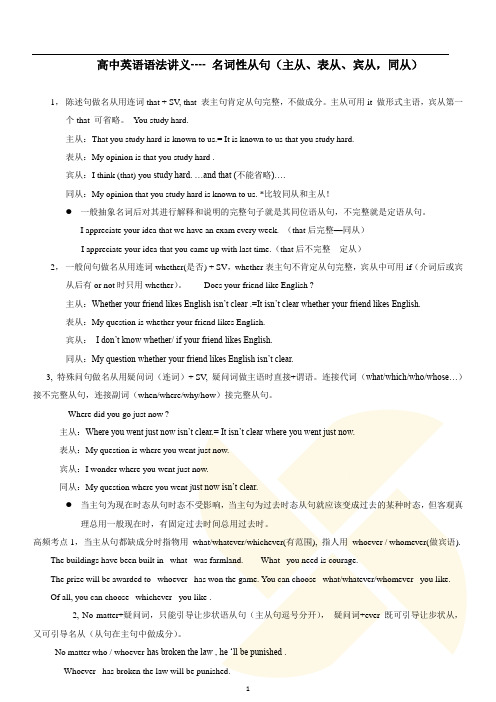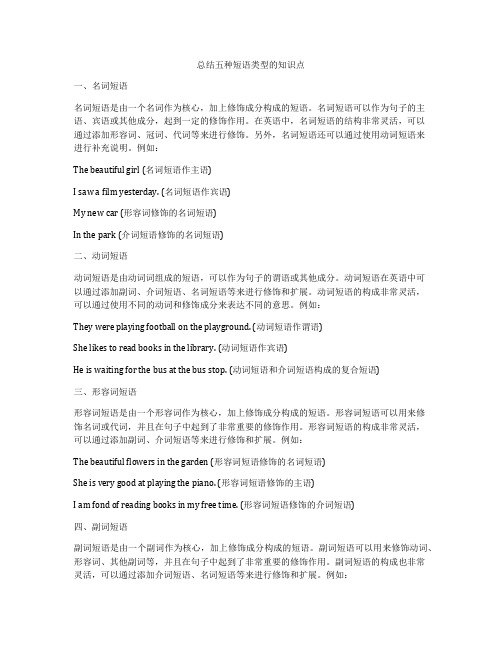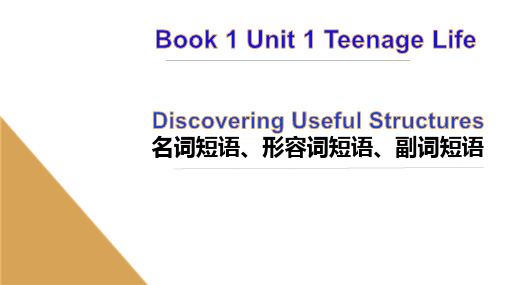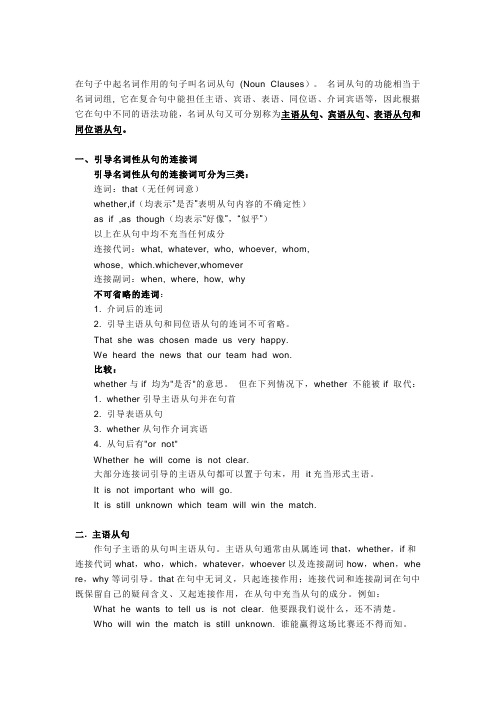高中英语学习知识点课堂:名词性短语讲义
高中英语语法讲义——名词性从句(主从、表从、宾从,同从)

高中英语语法讲义---- 名词性从句(主从、表从、宾从,同从)1,陈述句做名从用连词that + SV, that 表主句肯定从句完整,不做成分。
主从可用it 做形式主语,宾从第一个that 可省略。
You study hard.主从:That you study hard is known to us.= It is known to us that you study hard.表从:My opinion is that you study hard .宾从:I think (that) you study hard. …and that (不能省略)….同从:My opinion that you study hard is known to us. *比较同从和主从!●一般抽象名词后对其进行解释和说明的完整句子就是其同位语从句,不完整就是定语从句。
I appreciate your idea that we have an exam every week. (that后完整—同从)I appreciate your idea that you came up with last time.(that后不完整---定从)2,一般问句做名从用连词whether(是否) + SV,whether表主句不肯定从句完整,宾从中可用if(介词后或宾从后有or not时只用whether)。
Does your friend like English ?主从:Whether your friend likes English isn’t clear .=It isn’t clear whether your friend likes English.表从:My question is whether your friend likes English.宾从:I don’t know whether/ if your friend likes English.同从:My question whether your friend likes English isn’t clear.3, 特殊问句做名从用疑问词(连词)+ SV, 疑问词做主语时直接+谓语。
Unit1语法知识名词短语形容词短语和副词短语课件高中英语人教版

系表
名词短语的功能
1.名词短语做主语
The cute girl that is wearing blue jeans is his sister
主语
系表
The suspicion that the cute girl is his sister is true.
主语
系表
名词短语的功能
The school adviser helped me choose the suitable ones. 2.名词短语做宾语
名词短语的构成
一个女孩
a girl
一个可爱的女孩
a cute girl
一个小个子的可爱女孩
a short cute girl
a cute short girl
注意:多个修饰词有特定的排序
“县官叔(序数词)叔(基数词)有一个美小圆旧黄的法国木书房”
名词短语的构成
那个穿蓝色牛仔裤的可爱女孩
the cute girl in blue jeans 介词短语做后置定语 the cute girl wearing blue jeans 分词短语做后置定语
Generally speaking,the more expensive the stereo , the better it is.
一般来说,立体声音响越贵越好。(作评注性状语,修饰整个句子)
去掉that 从句不完整 是定语从句
The cute girl that is wearing blue jeans is his sister
主语
系表
去掉that 从句完整 是同位语从句
The suspicion that the cute girl is his sister is true.
高中英语重点语法讲义内部资料

语法图解一.名词I. 名词的种类:II. 名词的数:1. 规则名词的复数形式:名词的复数形式;一般在单数形式后面加-s或-es..现将构成方法与读音规则列表如下:2. 不规则名词复数:英语里有些名词的复数形式是不规则的;现归纳如下:III. 名词的所有格:名词在句中表示所有关系的语法形式叫做名词所有格..所有格分两种:一是名词词尾加’s 构成;二是由介词of加名词构成..前者多表示有生命的东西;后者多表示无生命的东西.. 1. ’s所有格的构成:2. ’s所有格的用法:3. of所有格的用法:用于无生命的东西:the legs of the chair; the cover of the book用于有生命的东西;尤其是有较长定语时:the classrooms of the first-year students 用于名词化的词:the struggle of the oppressed二.冠词冠词分为不定冠词a; an;定冠词the;和零冠词..I. 不定冠词的用法:II. 定冠词的用法:III. 零冠词的用法:三.代词:I. 代词可以分为以下七大类:II. 不定代词用法注意点:1. one; some与any:1 one可以泛指任何人;也可特指;复数为ones..some多用于肯定句;any多用于疑问句和否定句..One should learn to think of others.Have you any bookmarks No; I don’t have any bookmarks.I have some questions to ask.2 some可用于疑问句中;表示盼望得到肯定的答复;或者表示建议;请求等..Would you like some bananas Could you give me some money3 some 和any修饰可数名词单数时;some表示某个;any表示任何一个..I have read this article in some magazine. Please correct the mistakes; if any.4 some和数词连用表示“大约”;any可与比较级连用表示程度..There are some 3;000 students in this school. Do you feel any better today 2. each和every:each强调个别;代表的数可以是两个或两个以上;而every强调整体;所指的数必须是三个或三个以上..Each student has a pocket dictionary. / Each of us has a dictionary. / We each have a dictionary.Every student has strong and weak points. / Every one of us has strong and weak points.3. none和no:no等于not any;作定语..none作主语或宾语;代替不可数名词;谓语用单数;代替可数名词;谓语单复数皆可以..There is no water in the bottle.How much water is there in the bottle None.None of the students are is afraid of difficulties.4. other和another:1 other泛指“另外的;别的”常与其他词连用;如:the other day; every other week; someother reason; no other way;the other特指两者中的另外一个;复数为the others..如:He held a book in one hand and his notes in the other.Two students in our class failed; but all the others passed the exam.2 another指“又一个;另一个”无所指;复数形式是others;泛指“别的人或事”如:I don’t like this shirt; please show me another one.The trousers are too long; please give me another pair / some others.Some like football; while others like basketball.5. all和both; neither和eitherall表示不可数名词时;其谓语动词用单数..both和all加否定词表示部分否定;全部否定用neither和none.All of the books are not written in English. / Not all of the books are written in English.Both of us are not teachers. / Not both of us are teachers. / Either of us is a teacher.四.形容词和副词I. 形容词:1. 形容词的位置:1 形容词作定语通常前置;但在下列情况后置:2 多个形容词修饰同一个名词的顺序:3 复合形容词的构成:II. 副词副词的分类:III. 形容词和副词比较等级:形容词和副词的比较等级分为原级;比较级和最高级..比较级和最高级的构成一般是在形容词和副词后加-er和-est;多音节和一些双音节词前加more 和most..1. 同级比较时常常用as…as…以及not soas…as…如:I am not so good a player as you are.2. 可以修饰比较级的词有:much; many; a lot; even; far; a bit; a little; still; yet; by far; any; a great deal..3. 表示一方随另一方变化时用“the more…the more…”句型..如:The harder you work; the more progress you will make.4. 用比较级来表达最高级的意思..如:I have never spent a more worrying day.5. 表示倍数的比较级有如下几种句型:Our school is three times larger than yours./Our school is four times as large as yours./Our school is four times the size of yours.6. 表示“最高程度“的形容词没有最高级和比较级..如:favourite; excellent; extreme; perfect..五.介词I. 介词分类:II. 常用介词区别:六.动词I. 动词的时态:1. 动词的时态一共有16种;以ask为例;将其各种时态的构成形式列表如下:2. 现在完成时与一般过去时的区别:1 现在完成时表示过去发生的动作或存在的状况;但和现在有联系;强调的是对现在造成的影响或结果;它不能同表示过去的时间状语连用;汉译英时可加“已经”等词..简言之;利用过去;说明现在..如:I have already read the novel written by the world-famous writer. 已经看过;且了解这本书的内容2 一般过去时只表示过去发生的动作或状态;和现在无关;它可和表示过去的时间状语连用;汉译英时可加“过”;“了”等词..简言之;仅谈过去;不关现在..如:I read the novel last month. 只说明上个月看了;不涉及现在是否记住I lived in Beijing for ten years.只说明在北京住过十年;与现在无关3. 现在完成时与现在完成进行时的区别:两者都可以表示“从过去开始一直持续到现在”;在含义上如着重表示动作的结果时;多用现在完成时;如着重表示动作一直在进行;即动作的延续性时;则多用现在完成进行时..一般不能用于进行时的动词也不能用于现在完成进行时..I have read that book.我读过那本书了..I have been reading that book all the morning. 我早上一直在读那本书..4. 一般将来时的表达方式:II. 动词的被动语态:七.情态动词I. 情态动词基本用法:II. 情态动词must; may; might; could; can表示推测:以must为例..must + dobe是推测现在存在的一般状态进行;must + be doing 推测可能正在进行的事情;must +have done是推测可能已经发生过的事情..1. must“肯定;一定”语气强;只用于肯定句中..He must be a man from America. / He must be talking with his friend. / He must have already arrived there.2. may和might“也许”;后者语气弱;更没有把握..可用于肯定句和否定句..He may not be at home. / They might have finished their task.3. can和could“可能”;could表示可疑的可能性;不及can’t语气强;用于肯定、否定、疑问句中..The weather in that city could be cold now.We could have walked there; it was so near.推测某事本来可能发生;但实际上没有发生Can he be in the office now No; he can’t be there; for I saw him in the libraryjust now.语气很强;常用于疑问句和否定句中III. 情态动词注意点:1. can和be able to: 都可以表示能力..但be able to可以表达“某事终于成功”;而can 无法表达此意..Be able to有更多的时态..另外;两者不能重叠使用..2. used to和would: used to表示过去常常做现在已经不再有的习惯;而would只表示过去的习惯或喜好;不涉及现在..3. need和dare作情态动词和实义动词的区别:两者作情态动词时常用于否定句和疑问句..其形式为:needn’t/daren’t do;Need/dare…do…做实义动词时可用于肯定句;否定句和疑问句..其形式为:needneeds/needed/daredares/dared to do; don’tdoesn’t/didn’t need/dare to do 八.非谓语动词I. 非谓语动词的分类、意义及构成:II. 做宾语的非谓语动词比较:III.非谓语动词做宾语补足语的区别:IV. 非谓语动词做定语的区别:V. 非谓语动词做主语和表语的区别:九.定语从句I. 定语从句起了形容词的作用;在句中修饰一个名词或代词..被修饰的词叫做先行词;引导定语从句的词叫关系词;他的作用一是放在先行词与定语从句中间起了连接作用;二是在从句中担当一个成分;并与先行词保持数的一致..II. that与which; who; whom的用法区别:III. as与which的区别:IV. 限制性定语从句与非限制性定语从句的区别:十.名词性从句十一..状语从句十二..倒装句十三..虚拟语气十四..重要句型1.It was not until midnight that he finished his task.2.Not until he came back from abroad was I able to see him again.3.The harder you work; the greater progress you will make.4.He walked around the house; gun in hand.5.May you be in good health6.Wish you a pleasant journey back home7.The professor was a humorous man with big nose and deep-set eyes.8.What surprised me mos t was his imagination and patience.9.He lay on the grass; with his eyes looking at the sky and his hands under hishead.10.Sitting under the tree are Mr. Green and his first teacher.11.On the wall hang two pictures of famous scientists.12.Looking back upon those past years; he couldn’t help feeling very proud.13.No soonerHardly had he arrived at the theatre thanwhen the play started.14.Young as he is; he has learned advanced mathematics.15.How I regret the hours wasted in the woods and fields16.There stands a beautiful vase in the corner of the room.17.Ten miles north of the town lies a paper factory.18.There goes the bell.19.Nowhere has the world ever seen such a bird as here.20.It is no use crying for help.21.If only I had been your student in the middle school22.It is believed that such a thing will not happen again.23.Only when he explained did I realize the reason for this.24.“He works particularly hard.” “So he does; and so do you.”25.Not only Alice but also Jane and Mary are tired of having one examination afteranother.26.Such was Albert Einstein; a simple person of great achievements.十五..动词搭配1. add to增加;增进add … to把…加进…add up相加add up to总计;所有这一切说明1 I don't think these facts will ________ anything.2 Fifty new books have been ________ the library.3 The music _________ our enjoyment of the film.4 You must have made a mistake when you _______ the bill ________.add up to; added to; add to; added…up2. break away from打破;脱离;挣脱;改掉 break down出毛病;身体精神衰弱;分解;拆开break off暂停;中断break in强行进入;插话break into闯入break into pieces成为碎片break out爆发break up捣碎;驱散;瓦解;学期结束;拆散break through突破1 The criminal managed to break _______ ______ the police and ran into the woods.2 When he heard the news; he broke _______ and cried.3 Don't break ________ while others are speaking.4 Why don't you break ________ for a few minutes and have some coffee5 When does school break ________6 After harvest we break _________ the soil with a tool pulled by two oxen. away from; down; in; off; up; up 3. bring up抚养;呕吐;提出bring about造成bring out拿出;出版bring in引入;引进;挣钱bring back使回想起bring down使下降;使倒下1 The shopkeeper brought his price _________ to only five dollars.2 The school has brought _________ new foreign teachers to teach oral English.3 The song brought ___________ happy memories of our schooldays.4 Do you know what brought ___________ this misunderstanding5 The kind old man agreed to bring __________ the young orphan.6 We decided to bring the matter ___ at the next meeting.7 The wind brought _______ a lot of trees last night.8 Next month they will bring ________ a new edition of the book. down; in; back; about; up; up; down; out4. call on号召;拜访某人call at拜访、参观某地call for去叫某人; 要求; 需要call up使回忆起; 征召入伍call in召集;请某人来call out大喊;高叫call off取消;不举行1 Doctors are often called _____ in the middle of the war.2 Please wait for me at home. I'll call _______ you at your house at seven tonight.3 The trains calls _______ several big cities between Beijing and Guangzhou.4 He called her name __________; but she didn't answer.5 The sports meet was called ____ on account of the rain.in; for; at; out; off5. come about发生;出现come down下跌;落;降;传下来come in进来come into sight/being/existence/use/notice/eff ectcome on来临/ 快点come out出版;结果是come along一道来;赶快come to达到 an end/an agreement/a stop苏醒;合计;总共是come over走过来come up发芽;走近come across偶然碰到come back回想起come from来自;源自1 I come _________ the book I lent you last month.2 How did it come _________ that you both got lost I thought you had a map.3 It suddenly came _________ to me where I had seen the boy before.4 Come __________ now; or else we shall be late.5 He came __________ me like a tiger.6 The price of petrol has come _________ since the beginning of this year.7 The word came __________ use many years ago.8 When the examination result came _________; he had already got a job.9The bill came __________ over a thousand dollars.10 I sowed the seeds over a month ago; but they haven't come __________ yet. for; about; back; on; at; down; into; out; to; up6. cut across抄近路cut down砍倒;削减cut off切断;割掉;断绝关系cut up连根拔除;切碎through剪断;凿穿cut out删省掉;戒掉cut in插嘴1 Don't cut ___ this tree. It will be very shady in summer.2 You must cut ________ the number of cigarettes you smoke; or it will causeillness.3 We decided to cut _________ the moor 旷野 to the village.4 Cutting the tree ____ means cutting the tree into pieces.5 The electricity was cut ___________ when the lady refused to pay the bill.6 We were having a pleasant conversation when Tom cut __________. down; down; across; up; off; in7. die of disease/hunger/grief/old age 死于疾病;饥饿;寒冷;情感原因die from死于意外事故、情形die away渐渐消逝die out绝种die down炉火渐熄die off逐一死去8. fall behind落后fall over one's feet 跌跤fall down掉下;跌倒fall back撤退;后退1 Babies often fall _____ when they are learning to walk.2 Our team seems to have fallen __________ the others.3 As soon as the enemies fell __________; the people returned to their village.4 She fell__________ the bench and had her leg broken.down; behind; back; over9. go in for从事;喜爱;参加go through通过;经受go over复习;检查go up价格上涨;建造起来go after追捕;追赶go against违反go ahead先行;开始吧;问吧;说吧go away离开go by时间过去go down下沉;降低;日、月西沉go onwith继续进行go with相配;陪同go without没有;缺少go out外出;熄灭go all out全力以赴go off爆炸;进行;变坏;断电;停止供应 go back on背约;食言go beyond超出1 Many new factories have gone __ inthe past few years.2 Rents have gone __________ greatly recently.3 Many years have gone ___________ since we first met.4 Let's continue our journey until the sun goes _______.5 His actions went ___________ the will of the people;6 I can't do it; for it goes ___________ my duty.7 Over 100 students went ____________ this entrance examination.8 The bomb went ____________ and killed ten people.9 The buyer went ___________ the car carefully before reaching a decision.10 This tie doesn't go ___________ my blue shirt.11 If you think you can solve the problem; go ______.12 Many students went __________ playing basketball.up; up; by; down; against; beyond; through; off; over; with; ahead; in for 10. get down下来;记下;使沮丧get down to致力于;专心于get on进展;进步;穿上;上车get off脱下;下车get in收集;插话get away逃跑;逃脱;去休假get over忘记;越过;克服;从疾病中恢复get along with进展;相处get up起床get through打通电话;完成;通过get round消息传开get close to sth. 接近;几乎get into troubleget to knowget back取回;收回get out1 She spoke so fast that I couldn't get ____ what he said.2 We will find ways to get _________ difficulties.3 The story has got __________; and everyone knows about it.4 When I get _________ with the report; I'll go to the cinema.5 After a delicious meal the two men got __________ to business.6 Don't always get __________ a word when others are speaking.7 It took me a long time to get ___________ such an unpleasant experience.down; over; round; through; down; in; over11. give away赠送;泄露;出卖give out发出;疲劳;分发;公布give off发出光、热、气体give in to sb. 屈服give up放弃;让座位1 His accent at last gave him __________.2 The liquid gave ________ a strong smell.3 The headmaster gave ___________ the names of the prize-winners.4 The soldiers gave _________ the town to the enemies.5 Who will help me to give the books ___________6 Don't believe in those who give his friends ________.7 After a long walk; my strength gave ____________.away; off; out; up; out; away; out 12. hand in交上;提交hand out分发hand down流传;遗传13. hang about闲逛hang up挂电话14. hold back阻止;隐瞒hold up举起;使停顿hold on别挂电话;等;坚持hold out持续;坚持;伸出hold down控制;镇压1 I'm sure he is holding something _________.2 She managed to hold ______ her emotion until her guests had left. Then she cried.3 Tell him to hold ________ a moment. I'll come soon.4 Our food supply won't hold _________ for more than a few days.5 The train was held ________ as a result of the floods.6 These measures helped to hold ___________ the city's population.7 Hold ___________ your left arm; please.back; back; on; out; up; down; up 15. keep up courage; English; spirits 保持;keep up with跟上keep off grass不接近;离开keep away from避开;不接近;离…远远的keep out ofkeep to rules; promise坚持;遵守keep on继续;坚持下来keep back阻止;留下;隐瞒;扣下keep from克制;阻止1 The angry lady told the strangers to keep ________ from her.2 I can hardly keep ________ my tears after hearing his words.3 Only pride kept her __________ bursting into tears.4 I can scarcely keep __________ asking him what he has done.5 "Don't touch me;" screamed the woman; "Keep __________"6 Keep _________ until you succeed.7 Keep _________ your courage; and you'll succeed in the end.8 The thick coat can keep the cold ___________.9 Always try to keep ___________ the rules when you play a game.10 I can't keep ________ with everything you're doing.away; back; from; from; off; on; up; out; to; up16. knock at/on敲knock into撞到某人身上knock down撞倒knock out of把…敲出knock over撞倒knock off停止工作;休息1 The boxer soon knocked his opponent _________.2 The office stuff knocks _________ at six every day.3 Try knocking __________ the window and see if there is anyone indoors.4 He was so absorbed in his book thathe knocked __________ the car parked there.down; off; on; into17. leave for离开前往leave out删去;遗漏leave behind遗留;忘记拿走leave to留给;遗嘱赠于leave over遗留;剩下;延期1 "Whose name has been left __________ " demanded the teacher.2 When he died; he left all his property _____ his niece.3 He suddenly realized that he had left his umbrella ___________.4 Don't leave this matter _________ until tomorrow.5 Leave some meat ___________ for tomorrow.6 Those are questions left _________ by history.out; to; behind; over; over; over 18. look up查找;向上看look through翻阅;浏览look on旁观look on…as看作 look into调查look after/ at / for 照顾/看/寻找 look outfor当心look about / around/round四下查看 look down upon瞧不起look back upon回忆;回顾look ab. up and down仔细打量某人look ab in the face/eyes直视某人1 I spent two hours looking ______ the students' papers.2Look _______ There is a big hole in front.3 He took part in the game; and the rest of us just looked ______ and cheered for him.4 The old man looked _____ upon the days of his youth.5 She was so snobbish势利that she looked __________ upon all his neighbours.6 The police promised to look __________ the case as soon as possible.7 He looked __________ but saw nobody; and he listened but hearnothing.through; out; on; back; down; into; about/around/round19. make up编造;配制;打扮;组成make up for弥补make into / of / from 制成make out弄懂;发现;看出;填写;开列清单make for走向;驶往;促使1 Can you make this length of cloth __________ a suit2 I asked the driver if he was making ___________ London3 My father made __________ a check for me to buy the camera.4 We must make the loss _________ next week./ He tried hard to make ________ forthe damage he had done.5 He made __________ a story; whichI found hard to believe.6 Someone is coming; but I can't make ___________ who it is.into; for; out; up/up; up; out 20. pass away去世 pass by经过pass downon…to传给pass through经历pass over漠视;忽视1 The old clock has been passed ________ to me from my grandfather's grandfather.2 The man passed ___________ last week in peace.3 We are passing ____________ difficult times.4 The secretary passed ___________ the details in the first part of his report.down; away; through; over21. pay back还钱;报复pay for付钱;为…受到惩罚;因…得到报应pay off还清1 How much did you pay __________ the dictionary2 You should pay _________ the money you borrowed from me.3 I'll pay him ____________ for all his crimes罪行 against me.4 Some day; you'll pay __________ what you have done today.5 Has she pay ____________ the debt yetfor; back; back; for; off22. pick up拾起;获得information;接人;站起;收听;自然习得language/knowledge;恢复重获pick up healthpick out挑选;辨认;看出1 I picked the information __________ while waiting in the queue.2 My friend has arranged to pick me _________ at 6:00.3 The patient has picked _________ health during the last two weeks.4 She picked _______ the most expensive pair of shoes.5 I can't pick John ___________ in the crowd.6 Can I pick __________ VOA with this short-wave radio7 He fell down suddenly; but picked himself ___________ quickly.up; up; up; out; out; up; up pick cotton/flower/leaves/words选词23. put up搭起;张贴;举起;安装;投宿;安排住下put up with忍受put out伸出;扑灭put off推迟put into放进;翻译put away放好;存钱put down记下;平息put on穿戴;上映;增加put on weight/speedput forward 提出;提前put through 接通电话put aside放到一边put back放回1 He put _________ half his wage every week.2 The government soon put __________ the revolt暴乱.3 Put your watch __________. It's slow.4 He put __________ his hand for me to shake.5. Please put me __________ toExtension分机2.6 We put ___________ for night at the village inn.7 He is very proud; and he often put _________ airs.摆架子8 We had a telephone put _____________ in our office.9 I can't put __________ with your laziness.away; down; forward; out; through; up; on; up; up24. pull down拆掉;推翻 pull on 匆匆穿上 / off 脱pull in进站 pull out 取出;火车离站pull down往下拉;拆毁 pull over驶到一边pull through恢复健康;渡过难关;脱离险境 pull up使停住1 The train slowly pulled __________ and disappeared in the distance.2 All the old houses here have now been pulled ______; and new ones are to be built.3 The car pulled _________ when I blew the horn.4 The doctor thinks the man will pull __________.5 The driver pulled ________ at the traffic lights.out; down; over; through; up25. push over推倒;刮倒push aheadon; forward继续前进;坚持下去push through排除困难办好谋事;努力设法通过;挤过1 We've decided to push __________ with our plan to build a new road2 Many trees were pushed __________ in the hurricane.3 They were determined to push the new rules ________ at any cost..4 Take care not to push the baby _________.5 They pushed ___________ the crowd and at last reached us.on; over; through; over; through 26. run across偶然碰到 run after 追逐;追捕run away逃跑 run for竞选run into偶然碰到困难遇见人;相撞run out of用完1 If you drive so fast; you'll run _________ someone some day.2 I ran __________ a friend of mine in the exhibition.3 Our water has run __________. Can you fill up some more bottles4 Why do you always run __________ adventure5 He didn't want to run ___________ president that year.6 In that way you will only run __________ difficulties.into; across/into; out; after; for; into27. see off送行see through看透;识破see to照料;照管28. send for派人去请send off送行send out发出光亮等send up发射29. set up建立 set off出发;触发;引起set out动身;着手to do;陈述set about开始着手doingset to workn.开始做set back拨回;使推迟1 I shall set my watch ___________ by five minutes.2 We set __________ reading the text aloud immediately the bell rang.3 We set _________ at daybreak yesterday and we've been travelling ever since then.4 I set __________ to advise him not to drink.5 What were the reasons he set ___________ in his report6 The president set __________ a special group of soldiers to guard him.7 The unpopular law set _________ a series of protests.抗议back; about; off/out; out; out; up; off30. take off脱掉;起飞 take on 呈现雇佣take away拿走 take in吸收;领会take up从事;占用时间空间take down记录;取下 take back 收回take for误认为 take along随身带take over接管 take out1 I take _________ all I said about his dishonesty.2 He went to the shelf and took __________ a book of poems.3 At first I took him _________ a doctor.4 I can see that most of you have taken ________ everything that the teacher taught.5 Bill has now taken __________ his father's business.6 My job takes __________ most of my time.7 The boss took ____________ twenty people for his new company.back; down; for; in; over; up; on take charge of负责; take sth. for granted想当然; take hold of抓住; take pride in以… ……为自豪; take the place of; 代替take turns to do轮流做; take office就职31. think of想起 think of…as把…看作think out想出 think up想出think about考虑 think over仔细考虑think well of sb. 对某人看法好32. turn off / on打开turn over翻身;反复考虑;翻书页;翻转 turn out证明为;结果;制造成品turn to转向;求助turn down调低;拒绝turn against变得敌视;反对turn away打发走;驱逐;转过脸去turn back返回;转回去turn round转过身来turn up向上翻;露面;出现;音量调大 turn in上缴turn upside down把倒置;弄得乱七八糟1 The child turned __________ itsmother for comfort.2 Turn ___________ and let me see your face.3 However much he turned the problem ________ in mind; he could find no satisfactory solution.4 The English evening party turned _________ a great success.5 The sight of the accident was too much for her to bear; and she turned _______.6 The football stadium was full; and many people had to be turned __________.7 The army turned him ___________ on account of 因为 his poor health.8 She turned the whole house ___________ in her search for her missing purse.9 Where did your purse turn ____________ I found it in the snow.10 The villagers suddenly turned __________ the foreigners who lived nearby.11 The factory turns ____________ 2000 new cars last year.to; round; over; out; away; away; down; upside down; up; against; out。
总结五种短语类型的知识点

总结五种短语类型的知识点一、名词短语名词短语是由一个名词作为核心,加上修饰成分构成的短语。
名词短语可以作为句子的主语、宾语或其他成分,起到一定的修饰作用。
在英语中,名词短语的结构非常灵活,可以通过添加形容词、冠词、代词等来进行修饰。
另外,名词短语还可以通过使用动词短语来进行补充说明。
例如:The beautiful girl (名词短语作主语)I saw a film yesterday. (名词短语作宾语)My new car (形容词修饰的名词短语)In the park (介词短语修饰的名词短语)二、动词短语动词短语是由动词词组成的短语,可以作为句子的谓语或其他成分。
动词短语在英语中可以通过添加副词、介词短语、名词短语等来进行修饰和扩展。
动词短语的构成非常灵活,可以通过使用不同的动词和修饰成分来表达不同的意思。
例如:They were playing football on the playground. (动词短语作谓语)She likes to read books in the library. (动词短语作宾语)He is waiting for the bus at the bus stop. (动词短语和介词短语构成的复合短语)三、形容词短语形容词短语是由一个形容词作为核心,加上修饰成分构成的短语。
形容词短语可以用来修饰名词或代词,并且在句子中起到了非常重要的修饰作用。
形容词短语的构成非常灵活,可以通过添加副词、介词短语等来进行修饰和扩展。
例如:The beautiful flowers in the garden (形容词短语修饰的名词短语)She is very good at playing the piano. (形容词短语修饰的主语)I am fond of reading books in my free time. (形容词短语修饰的介词短语)四、副词短语副词短语是由一个副词作为核心,加上修饰成分构成的短语。
新人教高中英语 Unit1 语法-名词短语,形容词短语,副词短语

1. 主谓 (S V) 2. 主谓状 (S V A) 3. 主谓宾 (S V O) 4. 主谓宾状 (S V O A) 5. 主系表 (S P) 6. 主谓双宾 (S V IO DO) 7. 主谓宾+宾补 (S V O OC) 8. there be …
Step 1: Lead-in: Let’s find the difference What can you see in the pictures?
作_S_主__语________
②We respect our teacher very much.
作_O__宾__语_______
③ The young lady standing there is my sister. 作_P_表__语________
④ We elected him monitor of our class.
作_O_C__宾__语__补__足__语
[Conclusion] 名词短语的功能:在句中作名词用,一般用作 主___语__、__宾__语___、__表__语__、___宾__语__补___足__语____ 等。
1、Noun Phrase名词短语 (NP)
[Read and think]
① The boy is my brother.
[提示] 限定词包括:冠词(a/an/the)、指示代词(this/that/these/those等)、物 主代词(my/your/his/her/our/their等)和不定代词(some/no/neither/both等)。
2、Adjective Phrase形容词短语 (AdjP)
形容词短语是指以一个形容词为中心构成的短语,在句子中的功 能相当于形容词。 [Read and think] Find out the function of the underlined words of each sentence
英语语法基本知识——名词短语

在句子中起名词作用的句子叫名词从句(Noun Clauses)。
名词从句的功能相当于名词词组, 它在复合句中能担任主语、宾语、表语、同位语、介词宾语等,因此根据它在句中不同的语法功能,名词从句又可分别称为主语从句、宾语从句、表语从句和同位语从句。
一、引导名词性从句的连接词引导名词性从句的连接词可分为三类:连词:that(无任何词意)whether,if(均表示“是否”表明从句内容的不确定性)as if ,as though(均表示“好像”,“似乎”)以上在从句中均不充当任何成分连接代词:what, whatever, who, whoever, whom,whose, which.whichever,whomever连接副词:when, where, how, why不可省略的连词:1. 介词后的连词2. 引导主语从句和同位语从句的连词不可省略。
That she was chosen made us very happy.We heard the news that our team had won.比较:whether与if 均为"是否"的意思。
但在下列情况下,whether 不能被if 取代:1. whether引导主语从句并在句首2. 引导表语从句3. whether从句作介词宾语4. 从句后有"or not"Whether he will come is not clear.大部分连接词引导的主语从句都可以置于句末,用it充当形式主语。
It is not important who will go.It is still unknown which team will win the match.二. 主语从句作句子主语的从句叫主语从句。
主语从句通常由从属连词that,whether,if和连接代词what,who,which,whatever,whoever以及连接副词how,when,whe re,why等词引导。
高中英语九大词性分类与用法详解课件:专题02 名词
passers-by
过路人
editor-in-chief editors-in-chief 总编辑
brother-in-law brothers-in-law 姐夫
②无主体名词的复合名词,在词尾加-s.
grown-up
grown-ups 成年人
hang-up
hang-ups 障碍
go-between
② 以s结尾的复数名词的所有格形式只在词后加~’。 如:the teachers’ office
③ 以s结尾的专有名词的所有格,既可加~’s
也可加~’。如:Engels’(s)letter
④ 两者或两者以上共有的所有格形式只在后者用 所有格形式,如:Tom and Mike’s room
若表示分别拥有时,则要在每个名词后用 所有格形式,如:Tom’s and Mike’s rooms
群岛、山脉、亚运、奥运等名词视为复数,
the Rocky Mountains(落基山脉) the Olympic Games(奥林匹克运动会)
(4)变为复数形式,意义不同的名词
paper纸张 papers文件
time时间
content容量 contents目录 Nhomakorabeawork工作
arm胳膊
arms武器
custom习俗
good好处
goods货物
water水
It is the custom of foreigners to do so.
Did you have any trouble with the customs?
I hurt my arm. There’s a lot of blood.
Take up arms against the enemy.
高中英语名词语法总结大全
高中英语名词语法总结大全(名师剖析语法知识点,建议下载背诵)名词概论名词可以分为专有名词(Proper Nouns)和普通名词(Common Nouns),专有名词是某个(些)人,地方,机构等专有的名称,如Beijing ,China等。
普通名词是一类人或东西或是一个抽象概念的名词,如:book,sadness等。
普通名词又可分为下面四类:1)个体名词(Individual Nouns):表示某类人或东西中的个体,如:gun。
2)集体名词(Collective No uns):表示若干个个体组成的集合体,如:family。
3)物质名词(Material Nouns):表示无法分为个体的实物,如:air。
4)抽象名词(Abstract Nouns ):表示动作、状态、品质、感情等抽象概念,如:work。
个体名词和集体名词可以用数目来计算,称为可数名词(Countable Nouns),物质名词和抽象名词一般无法用数目计算,称为不可数名词(Uncountable Nouns)。
归纳一下,名词的分类可以下图表示:名词专有名词普通名词个体名词可数名词集体名词物质名词不可数名词抽象名词名词复数的规则变化情况构成方法读音例词一般情况加-s 1.清辅音后读/s/; map-maps2.浊辅音和元音后读/z/ bag-bags car-cars以s,sh,ch, x等结尾的词加-es 读/iz/ bus-buseswatch-watchesce,se,ze, (d)ge等结尾的词加-s 读/iz/ license-licenses以辅音字母+y结尾的词变y 为i再加es 读/z/ baby---babies其它名词复数的规则变化1) 以y结尾的专有名词,或元音字母+y 结尾的名词变复数时,直接加s变复数:如:two Marys the Henrysmonkey---monkeysholiday---holidays比较:层楼:storey ---storeysstory---stories2) 以o 结尾的名词,变复数时:a. 加s,如:photo---photospiano---pianosradio---radioszoo---zoos;b. 加es,如:potato--potatoestomato—tomatoesc. 均可,如:zero---zeros / zeroes3) 以f或fe 结尾的名词变复数时:a. 加s,如:belief---beliefsroof---roofssafe---safesgulf---gulfs;b. 去f,fe 加ves,如:half---halvesknife---knivesleaf---leaveswolf---wolveswife---wiveslife---livesthief---thieves;c. 均可,如:handkerchief:handkerchiefs / handkerchieves名词复数的不规则变化1)child---childrenfoot---feettooth---teethmouse---miceman---menwoman---women注意:与man 和woman构成的合成词,其复数形式也是-men 和-women。
高中英语语法:名词知识点归纳总结
高中英语语法:名词知识点归纳总结考向一可数名词的复数(1)规则变化注意:①以-o结尾的下列名词要加-es,它们是"黑人英雄在回声中吃土豆、西红柿",即Negroes,heroes,echoes,potatoes,XXX。
但下列以-o结尾的名词既可以加-es,也可以加-s,它们是:zeros(zeroes)零,mosquitos (mosquitoes)蚊子,volcanos(volcanoes)火山。
②以-f或-fe结尾的下列名词需要把f或fe去掉,加-XXX,它们是"为了自己活命,小偷和他的妻子手里拿着刀子和树叶站在架子上,把狼劈成两半",即selves,XXX,XXX,wives,knives,XXX,shelves,wolves,halves。
但下列以-f结尾的名词既可以去掉f加-ves,也可以直接加-s,如:handkerchiefs (XXX)手帕。
③名词前有man或woman修饰,变复数时,作定语的man或woman和后面的名词都要变成复数。
如:XXX(2)不规则变化①常见单复数同形的名词Chinese中国人;sheep绵羊;deer鹿;series系列;means 体式格局;works工场;fish鱼;fruit生果等。
个中fish,fruit 表示种类时,可加复数词尾,即fishes,fruits。
②自身有特殊变化的名词child孩子→XXX男人→XXX→XXX脚,XXX→XXX现象→phenomenamedium传播媒介→media考向二不可数名词具体化(1)通常只用作不可数名词的名词:advice发起,furniture 家具,fun兴趣;information信息,news消息,weather气候,XXX进步,XXX财产,value代价等。
(2)不可数名词具体化①具有某种特性、状态、情感的笼统名词在表示具体的概念时,可以与不定冠词连用,常考的有:XXX make the event a huge success.你的进献一定会使这个变乱很胜利。
英语名词性短语 与用法讲义2023届高考英语复习
Noun Phrases名词性短语Noun - a word that names a person, place, thing, or idea名词可以命名人、地点、事物或观点。
Noun Phrase - a noun and any words in the sentence that modify it; words that can modify nouns include articles (a, an, the); adjectives; participles; and possessive pronouns名词短语:名词和句中修饰名词的任意词语;可以修饰名词的词语包括冠词(a, an, the)、形容词、分词和物主代词。
A noun phrase can be a single word -just the noun- or more than one word.名词短语可以是单个词语(一个名词)也可以是多个词语。
Noun phrases can function in several different ways in a sentence. Some of the most common functions of noun phrases are listed below.名词短语在一句话中有不同的功能。
下面列出了最常见的功能。
1. A noun phrase can be a subject:1. 名词短语作主语2. A noun phrase can be a direct object:2. 名词短语作直接宾语3. A noun phrase can be the object of a preposition:3. 名词短语作介词宾语4. A noun phrase can be an indirect object:4. 名词短语作间接宾语名词短语的例子:a yellow house 一栋黄色的房子a skate board 一个滑板the glistening snow 晶莹的雪Each of these phrases contains a noun (house, board, snow). The other words modify the noun.这几个短语中都包括一个名词(house, board, snow)。
- 1、下载文档前请自行甄别文档内容的完整性,平台不提供额外的编辑、内容补充、找答案等附加服务。
- 2、"仅部分预览"的文档,不可在线预览部分如存在完整性等问题,可反馈申请退款(可完整预览的文档不适用该条件!)。
- 3、如文档侵犯您的权益,请联系客服反馈,我们会尽快为您处理(人工客服工作时间:9:00-18:30)。
高中英语学习知识点课堂:名词性短语
名词性短语(Noun phrase)又叫名词词组,它是一个语法学术语,是指语法功能相当于名词的一类短语。
名词性短语一般可以在句子中充当主语、宾语和表语等成分。
一、名词词组的构成:限定词+形容词+名词
名词词组的核心部分是名词,常常有三部分构成,名词常位于词组的最后,其前面是修饰成分,一般是形容词,形容词前常是限定词,限定词又常包括冠词、不定代词和形容词性物主代词三种。
我们已经熟知三个冠词:a、an、the,它们不能独立做句子成分,其后一定有名词(或相当于名词的词);
物主代词是代词的一种,它分为形容词性物主代词和名词性物主代词,两者的关系是:形容词性物主代词+名词=名词性物主代词。
和冠词一样,形容词性物主代词不单独做句子成分,其后一定有名词(或相当于名词的词)。
形容词性物主代词有:
my(我的)
your(你的,你们的)
his(他的)
her(她的)
our(我们的)
their(他们的)
我们先罗列部分名词:
girl(女孩)
apple(苹果)
pencil(铅笔)
book(书本)
movie(电影)
cat(猫)
我们再来罗列部分形容词:
beautiful(漂亮的)
tall(高的)
cute(可爱的)
quiet(安静的)
red(红色的)
interesting(有趣的)
funny(搞笑的)
4类词都已罗列完毕,那么我们就可以把这4类词按照一定的语法规则组合成具有一定意义的词组,这个词组就是名词词组,如:
a beautiful girl(一个漂亮的女孩)
the tall gir l(这个高个子女孩)
an interesting book(一本有趣的书)
the funny book(这本搞笑的书)
my red apple(我的红色苹果)
your cute cat(你那只可爱的猫咪)
还有一类限定词就是不定代词,所谓不定代词,就是不指明代替特定名词或形容词的代词,如:
all(所有的)
most(大部分)
every(每一个)
each(每一个),
any(任何一个)
other(其他的)
the other(另外一个)
some(一些)
many(很多)
little(一点)
如果名词词组含有不定代词,也常常位于形容词的前面,如:
every funny movie(每一部搞笑的电影)
most quiet girls(大部分安静的女孩)
some red apples(一些红苹果)
many interesting books(许多有趣的书籍)
最后我们要知道,部分名词也可以修饰名词,一般包含以下几种情况:
1、表材料:a diamond ring(一枚钻戒)
the gold watch(那块金表)
2、表类型:dog food(狗粮)
childhood memory(童年记忆)
3、表内容:a story book(一本故事书)
the grammar rules(语法规则)
4、表时间:summer holiday(暑假)
evening suit(晚礼服)
5、表用途:a meeting room(一间会议室)
a tea cup(一个茶杯)
我们从以上短语种可以看到,名词修饰名词,永远要放在离被修饰词最近的位置,也就是如果有形容词的话,须把名词放在其后面的位置。
如:
a funny story book(一本有趣的故事书)
the red tea cup(那只红茶杯)
the happy summer holiday(那个快乐的暑假)
an unforgettable childhood memory(一个难忘的童年记忆)
我们已经知道:常见前置定语顺序是限定词+形容词+名词,其中,限定词包括不定代词、形容词性物主代词和冠词。
我们也已经知道,名词性短语在句子中通常作主语、宾语和表语。
下面我们具体进行学习。
1、作主语:
①the beautiful girl is my sister.(那个漂亮的女孩是我姐姐。
)
句子分析:句子主语部分是the beautiful girl,其中the beautiful 作girl的定语,属于修饰成分。
②A red apple is on the table.(一个红苹果在那张桌子上。
)
句子分析:句子主语部分是a red apple,其中a red 作apple的定语,属于修饰成分。
2、作宾语:
①I like all funny story books.(我喜欢所有搞笑的故事书。
)
句子分析:句子的宾语部分是all funny story books,其中all funny story作books的定语,属于修饰成分。
②I have some difficult math problems.(我有一些数学难题。
)
句子分析:句子的宾语部分是some difficult math problems,其中some difficult math作problems的定语,属于修饰成分。
3、
①It is another unforgettable childhood memory.(这是另一个难忘的童年记忆。
)
句子分析:another unforgettable childhood memory是句子的表语部分,其中,another unforgettable childhood作memory的定语,属于修饰成分。
②She must be a very good teacher.(她一定是一个非常好的老师。
)
句子分析:a very good teacher是句子的表语部分,其中,a very good 作teacher的定语,属于修饰成分。
注:very是副词,修饰形容词good,位于被修饰词good之前、限定词a之后。
